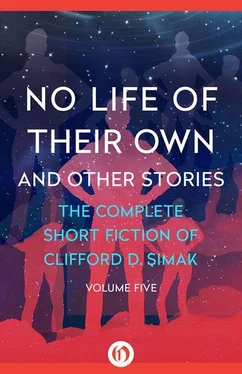He waited, crouched, wondering. Now it was above the trees at the edge of the field … coming in at possibly no more than a hundred feet above the ground.
Suddenly guns snickered and their first burst was followed by a scream of terror.
Leaping from under the wing, Douglas stood in astonishment. Grant was racing for the trees on the other side of the field, yelling, waving his arms, while all about him little puffs of white dust were dancing in the sunlight. With a blast of thunder the plane roared over, not more than fifty feet above the Hurricane, guns bellowing.
Frozen in his tracks, Douglas watched the tableau out there in the field. For a moment it seemed as if time stood still while the scene was etched upon his brain … the running man, the puffs of dust as the bullets from the Messerschmitt sprayed the ground, the tall trees looking on, the short yellow grass baking in the sun.
Then time took up again and Grant was stumbling. Stumbling while the jets of dust still flickered all around. He struck the ground, rose to his knees and crawled, then fell again and did not rise.
The Messerschmitt, with what seemed a scream of triumph, climbed over the edge of trees and howled into the sky. Circling, it swung back and roared toward the field again. Douglas quickly ducked out of sight as it skimmed over, riding on one wing, so the pilot could survey the squatting Hurricanes.
Probably, Douglas told himself, the Nazi was looking for him, for the other British pilot. For that was what Grant must have seemed … no more than a stranded Britisher … an enemy who was fair game. The man in the Messerschmitt could not possibly have known who Grant was. And after all, it added up to a sort of grim retribution. Grant, who had killed scores of his countrymen in the skies of England and along the coast, had been the quarry of his compatriot.
Douglas waited until the drone of the Messerschmitt had faded away, then ran across the field.
Grant, he saw, was dead, face downward, hands clutching at the yellow grass. Swiftly his hands felt through the pockets, found a small notebook and a sheaf of papers.
Squatting there, he leafed hurriedly through his find. The book, he saw, was filled with notes … closely written notes. What had seemed to a sheaf of papers was a map.
He whistled softly as he unfolded it. A map of the British Isles, showing hundreds of R.A.F. stations, a plain sign guide for an attempt to knock out the British air arm.
Studying it, he shuddered as he realized what such a map, in German hands, would mean. With that map, the Luftwaffe could deal a terrible blow to the R.A.F. That far-flung system of small bases, decentralizing the nation’s aerial forces, was it best insurance against a death smash by the Nazi fleet. Without the map it would take Goering’s tribe half a hundred years to hunt out and destroy, one by one, all those bases.
But with the map …
Douglas jerked his head up sharply. The Messerschmitt was coming back again!
The mutter rose into a hum and the hum became a roar. Stuffing the map into his pocket, Douglas sprinted for the Hurricane. Let that Messerschmitt catch him in the open and there’d be two dead men lying in the field.
Breath whistling in his throat, heart pounding furiously, he made the plane, scrambled into the cockpit and slammed the throttle up the rack. The idling prop swelled into a swirl of noise and power. The ship leaped forward and Douglas hauled back viciously on the stick.
The M.E.’s motors were a yell of hate behind him even as he cleared the treetops. He hunched his shoulders, expecting a hail of steel, almost feeling the breath of the Jerry’s guns upon him.
The guns whipped out … too late. He felt the thud of bullets smack into his ship, but he was in a steep climb now, moving out of range. Grimly he held the Hurricane’s nose almost straight up, watching the altimeter climb. Below him, he knew, the Messerschmitt must be climbing to get him. He snapped one quick look over the side, saw the Nazi ship off to his right. Giving the Hurricane the last notch on the rack, he looped and dived. With a wild yell of exultation, he snapped the ship straight at the Messerschmitt.
His finger touched the firing button and the Brownings yapped. Metal flew in showers from one of the M.E.’s wings. Trees were rushing up at him and he yanked the stick. The Hurricane groaned and whipped around just above the branches.
A storm of tracers slapped into the fuselage and he laughed wildly as he looped again and came down upon the Jerry.
There was no miss this time … no futile chewing of wings. He saw splintered glass flying as the Brownings raked the cockpit of the ship below him.
It wasn’t until he was far above the field and headed west that he realized his brain had failed to tick. There had been no calculation, no aversion to taking chances, no grimness. It was like the old days when he and Bob and Grant had battled at Dunkerque. He had fought by pure instinct alone, had downed his plane almost in the treetops.
He touched his pockets, heard the crinkling of the map when his fingers touched it.
Intelligence would be glad to see that map and hear his story. Intelligence undoubtedly would do something about it … for Grant could not have been the only one, there must have been others. Probably those had been the ones Grant had been sneaking off to London to see. Maybe the girl the boys had kidded him about back in the mess might be one of them.
But Intelligence was close-mouthed and the squadron would never know. And that was best, for Grant was a hero … and right now Britain needed all the heroes it could get … alive or dead.
His own report? That wasn’t hard to figure out. He could see it now:
“Flight Lieutenant Richard Grant met his death heroically, attempting to ride a crippled ship to earth.”
THE END
After being rejected by Astounding Science Fiction and Amazing Stories in 1939, Astonishing Science Fiction paid Clifford Simak $42.50 for “The Flame in Space” and published it in April 1940. Cliff’s journal shows that the sale was made after he sent it to Frederik Pohl, but it’s not clear whether Pohl was the editor of Astonishing or was acting as an agent—that issue of Astonishing did not list an editor’s name.
This is one of a number of Simak stories that features music in space; but its spiritual element makes it seem like more than a mere space opera.
—dww
CHAPTER ONE
The Flame in Space
It wasn’t possible … but there it was! A thing that hung in space on shimmering wings of supernal light. Wings that had about them that same elusive suggestion of life and motion as one sees in the slow crawl of a mighty river. Wings that were veined with red markings and flashed greenly in the rays of the distant Sun.
The body of the thing seemed to writhe with light and for a fleeting moment Captain Johnny Lodge caught sight of the incredible head … a head that was like nothing he had ever seen before. Ahead that had about it the look of unadulterated evil and primal cruelty.
He heard Karen Franklin, standing beside him, draw in her breath and hold it in her wonder.
“It’s a Space Beast,” said George Foster, assistant pilot. “It can’t be anything else.”
That was true. It couldn’t be anything else. But it violated all rules of life and science. It was something that shouldn’t have happened, a thing that was ruled out by the yardstick of science. Yet, there it was, straight ahead of them, pacing the Karen, one of the solar system’s finest rocket-ships, with seeming ease.
“It just seemed to come out of nowhere,” said George. “I think it must have passed the ship. Flew over us and then dipped down. I can’t imagine what those wings are for, because it travels on a rocket principle. See, there it blasts again.”
Читать дальше












